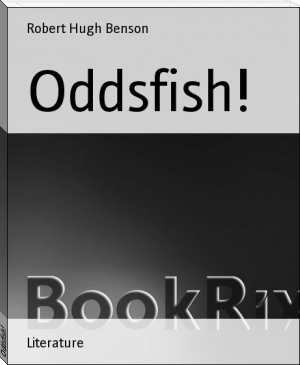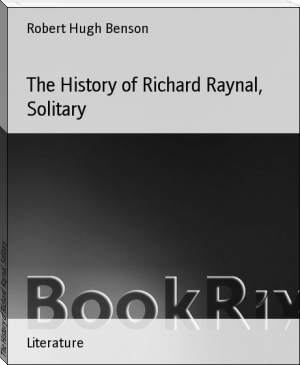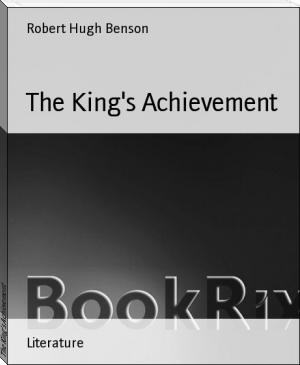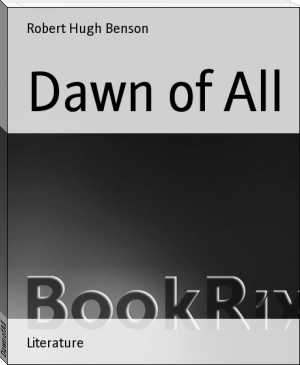Oddsfish! by Robert Hugh Benson (most interesting books to read .TXT) 📖

- Author: Robert Hugh Benson
Book online «Oddsfish! by Robert Hugh Benson (most interesting books to read .TXT) 📖». Author Robert Hugh Benson
"That is what we are met for," he said; and then--"Why, Mr. Mallock, I have not made these other gentlemen known to you."
They turned out to be--on the right of my Lord, the minister, Mr. Ferguson--he who had been spoken of before as an informant from Bristol; and a Colonel Rumsey--an old Cromwellian like the maltster of Hoddesdon--who sat next to Mr. Ferguson. We saluted one another; and then the affair began.
"Mr. Mallock," said my Lord, "the first piece of news is a little disappointing. It is that my Lord Shaftesbury is ill. It is not at all grave; but he is confined to his bed; and that throws back some of our designs."
(I made a proper answer of regret; and considered what was likely to be the truth. At the moment I could not see what this would be.)
"The next piece of news I have, gentlemen," went on my Lord--(for I think he thought he appeared to be speaking too much at me)--"is that owing to my Lord Shaftesbury's illness we must relinquish all thoughts of any demonstration in London. That, Mr. Mallock, was what we had hoped to be able to do in a week or two from now. Well; that is impossible. For the rest, Mr. Ferguson had better tell us."
This gentleman I took to be somewhat of an ass by his appearance and manner; but I am not sure he was not the cleverest liar of them all. He spoke with a strong Scotch accent, and an appearance of shy sheepiness, and therefore with an air too of extraordinary truth. He spoke, too, at great length, as if he were in his pulpit; and my Lord Essex yawned behind his hand once or twice.
Briefly put--Mr. Ferguson's report was as follows:
The discontent in the West was rising to a climax; and if a much longer delay were made, real danger might follow. It was sadly disconcerting, therefore, to him to hear that there was any hitch in the London designs: for the promise that he had given to some of the leaders in the West (whose names, he said, with an appearance of a stupid boorish kind of cunning, "had best not be said even here") was that a demonstration should be made simultaneously both here, in the West, and in Scot--
Here he interrupted himself sharply; and I saw that he had made a blunder. But he covered it so admirably, that if I had not previously known that discontent was seething among the Covenanters, I am sure I should have suspected nothing.
"In Scotland," said he, "we must look for nothing. They are forever promising and not performing--though I say it of my own countrymen. Any demonstration there would surely be a failure."
It was admirably done; and it was then that I perceived what an actor the man was.
Well; when he had done, we talked over it a while. I professed myself very well satisfied with what I had heard; and I put forward an opinion that it would be far better to delay no longer in the West. A demonstration there might lead to alarm here; troops might be withdrawn here, and relieve the pressure, and thus make possible a further demonstration in London. I spoke, I think, with some eloquence, remembering however that they all looked on me with the same confidence that I had in them--and no more: that is, that they believed me a liar. My observations were received with applause, very well delivered.
It was growing pretty late by the time we had done; yet before we went I had learned one more piece of news, partly through a little trap I laid, and partly through my Lord Essex's clumsiness.
"Well," said I, "I must be getting homewards, my Lords. I wish my Lord Shaftesbury had been here. Could I see his Lordship, do you think?--if I were to call at his town house? There is a very particular matter--"
My Lord Essex started a little. He was tired and overanxious, I think, with the continual part that he had to play before me; yet it was the first slip he made.
"My Lord is out of town--" he said. Then he paused. "You could not tell us, I suppose--"
I affected indifference. (Was my Lord out of town, I wondered?)
"Why; it is nothing," I said.
My Lord exchanged a look with Mr. Sheppard; and made his second mistake.
"I saw my Lord only--last week," he said suddenly. "He wishes his address to be private for the present; but--
"Do not trouble yourself, my Lord," I said. "I assure you it has nothing to do with our business here."
I repeated this, I think, with a good enough manner to persuade them that what I said was true; and presently afterwards took my leave.
As I sat in the wherry that took me back to the Privy Stairs--(I had announced of course, "to the Temple")--I was preparing in my mind what I should say. I had learned a considerable amount for an evening; for the conversation I had overheard, added to what Mr. Chiffinch had told me, added to what they had all said in the parlour, interpreted and fitted together, was pretty significant.
These were the points I arranged.
First, that the visit of the Duke, my Lord Grey and Sir Thomas Armstrong to Whitehall was to see in what state the guards were in case of a surprise; and the conclusion they had arrived at was they "were not like soldiers at all" but "very remiss."
Second, that a "demonstration" in London was very imminent.
Third, that they had won over my Lord Russell enough at least to gain the help that his name would give.
Fourth, I was confirmed in what Mr. Chiffinch had told me as to the probability of a rising in Scotland.
Fifth, I was confirmed in my view that the Duke was very deeply involved.
Sixth, it appeared to me exceedingly probable that my Lord Shaftesbury was still in town, though not in his own house: and, all things considered, it was very nearly certain that he was hidden in Wapping. He was, probably also, a little ill, or he would have been at our meeting to-night.
One conclusion then, immediate and pressing, came out of all this; that an assault on Whitehall and an attack on the King's person was in urgent contemplation.
* * * * *
Then, as we went up under the stars, my waterman and I, one of those moods came upon me which come on all men in such stress as I was; and I appeared to myself, for the time, to be worlds away from all this sedition and passion and fever. The little affairs of men which they thought so great seemed to me in that hour very little and wicked--like the scheming of naughty children, or the quarrels and spites of efts in a muddy pond. In that hour my whole heart grew sick at this miserable murderous pother in the midst of which my duty seemed to lie; and yearned instead to those things that are great indeed--the love of the maid who had promised herself to me, and the Love of God that should make us one. My religion--though I am a little ashamed to confess it--had been very little to me lately: I had heard mass, indeed, usually, on Sundays, in one of the privileged chapels, and had confessed myself at Easter and once since, to one of the Capuchins, and received Communion; yet, for the rest it had largely been blotted out by these hot absorbing affairs in which I found myself. But, in that hour (for the tide was beginning to set against us)--it came back on me like a breeze in a stifling room. I thought of that cleanly passionless life I had led as a novice, and of that no less cleanly, though perhaps less supernatural life, that should one day be mine and Dolly's--and these politics and these plottings and this listening at doors, and this elaborate lying--all blew off from me like a cloud.
When we were yet twenty yards from the Privy Stairs a wherry shot past us, with no light burning. There was but one passenger in it, whom I knew well enough, though I feigned to see nothing; and once more my sickness came on me, that it was for a King like this, slipping out on some shameful pleasure, that I so toiled and endangered myself.
* * * * *
When I had reported all to Mr. Chiffinch, sitting back weary in my chair, yet knowing that I must go through with the work to which I had set my hand, he remained silent.
"Well?" I said. "Am I wrong in any point?"
"Why no," he said. "Your information tallies perfectly with all I know, and has increased the sum very much. For example, I had no idea where my Lord Shaftesbury was. I have no doubt whatever, from what you say, that he is in Wapping."
"Will you send and take him there?" I asked.
"No," he said shortly. "Leave him alone. We failed last time we took him. And he can do no great harm there. Plainly too, he is at the waterside that he may escape if there is need. I shall set spies there; and no more."
"What is to be done then? Double the guards again?"
"Why that of course," said he.
"And what else?" I asked; for I could see that he had not said all.
"A counterstroke," he said. "But of what kind? You say the rising will be pretty soon."
"I do not suppose for a week or two at the most. They were decided, I am sure; but no more."
Suddenly the man slapped his leg; and his eyes grew little with his smile.
"I have it for sure," he said. "It will be for the seventeenth of November. That is the popular date. Queen Bess and Dangerfield and the rest."
"But what can you do?"
"Why," said he, "forbid by proclamation all processions or bonfires on that day. Then they cannot even begin to gather."
* * * * *
He proved right in every particular. The proclamation was issued, and met their intended assault to the very moment, as we learned afterwards, besides frightening the leaders lest their intention had been discovered: and the next night came one of the spies whom Mr. Chiffinch had sent down to Wapping, to say that my Lord Shaftesbury had slipped away and taken boat for Holland.
CHAPTER IX
Now indeed the fear grew imminent. I had thought that once my Lord Shaftesbury was gone abroad, one of two things would happen--either that the whole movement would collapse, or that the leaders would be arrested forthwith. But Mr. Chiffinch was sharper than I this time; and said No to
 Have you ever thought about what fiction is? Probably, such a question may seem surprising: and so everything is clear. Every person throughout his life has to repeatedly create the works he needs for specific purposes - statements, autobiographies, dictations - using not gypsum or clay, not musical notes, not paints, but just a word. At the same time, almost every person will be very surprised if he is told that he thereby created a work of fiction, which is very different from visual art, music and sculpture making. However, everyone understands that a student's essay or dictation is fundamentally different from novels, short stories, news that are created by professional writers. In the works of professionals there is the most important difference - excogitation. But, oddly enough, in a school literature course, you don’t realize the full power of fiction. So using our website in your free time discover fiction for yourself.
Have you ever thought about what fiction is? Probably, such a question may seem surprising: and so everything is clear. Every person throughout his life has to repeatedly create the works he needs for specific purposes - statements, autobiographies, dictations - using not gypsum or clay, not musical notes, not paints, but just a word. At the same time, almost every person will be very surprised if he is told that he thereby created a work of fiction, which is very different from visual art, music and sculpture making. However, everyone understands that a student's essay or dictation is fundamentally different from novels, short stories, news that are created by professional writers. In the works of professionals there is the most important difference - excogitation. But, oddly enough, in a school literature course, you don’t realize the full power of fiction. So using our website in your free time discover fiction for yourself. 




Comments (0)